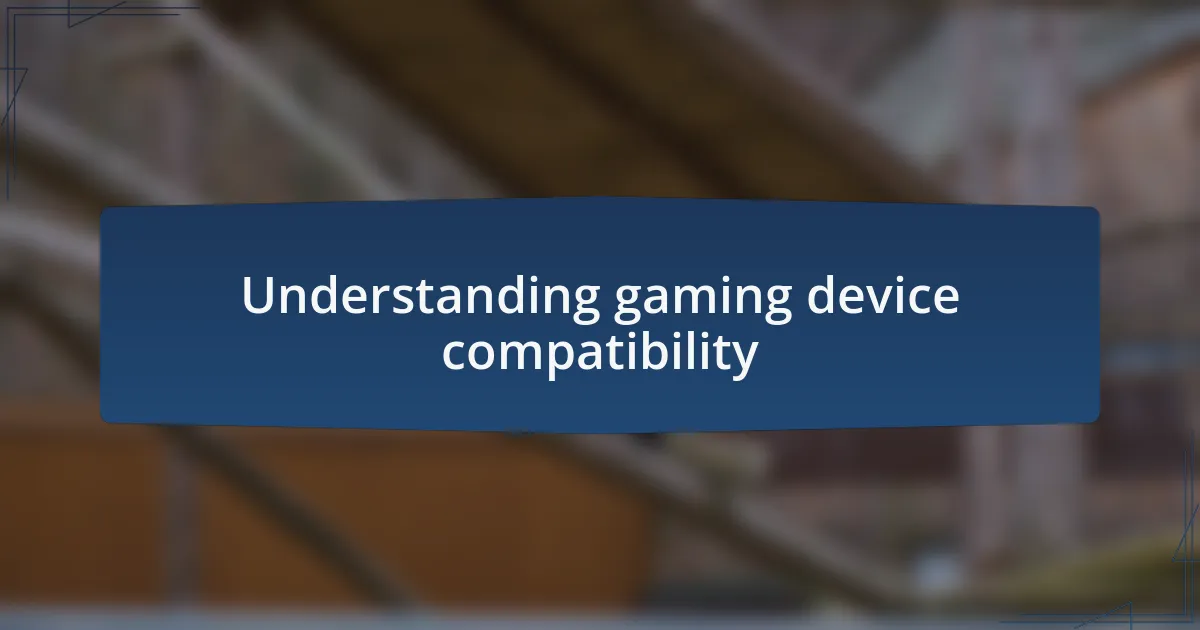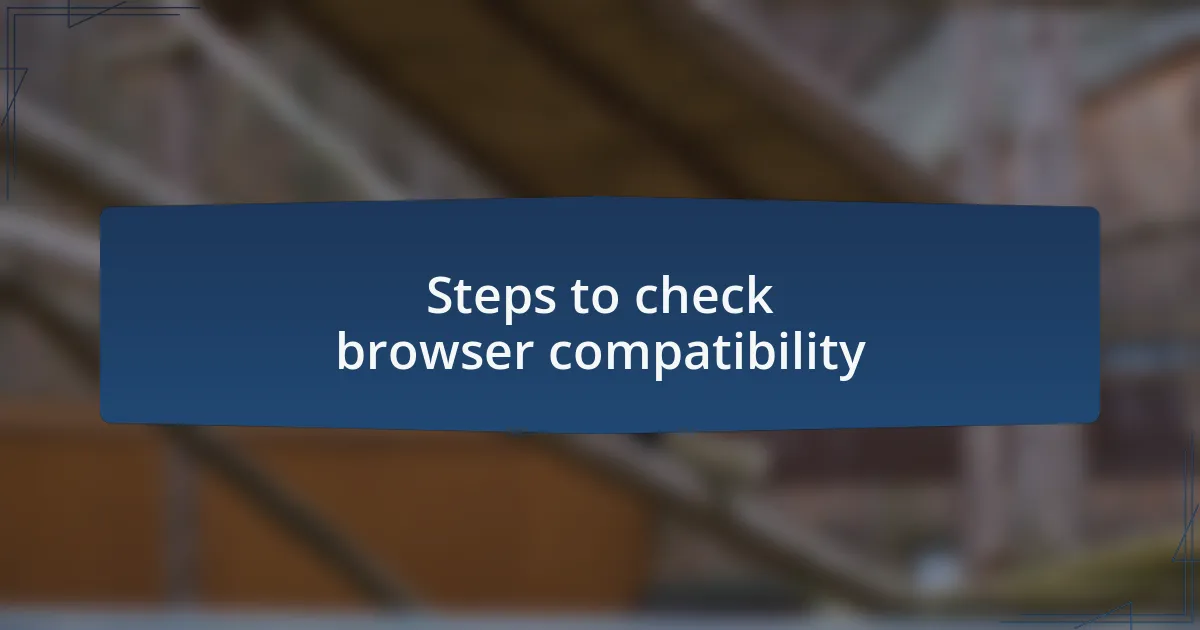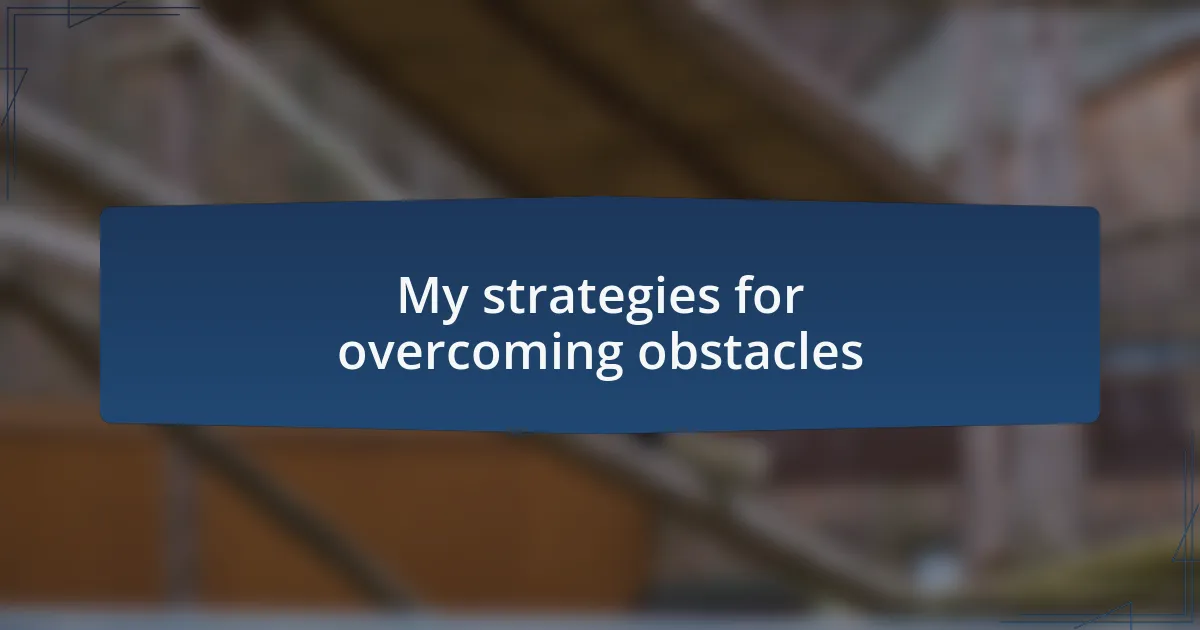Key takeaways:
- Understanding gaming device compatibility is crucial for maximizing gaming experiences, as different devices have unique specifications that can affect gameplay.
- Checking browser compatibility and utilizing testing tools can prevent frustration and enhance accessibility to online games.
- Engaging with online gaming communities can provide valuable insights and strategies for overcoming compatibility obstacles.
- Staying informed about updates and device capabilities is essential for ensuring a smooth gaming experience.

Understanding gaming device compatibility
When I first dipped my toes into the world of gaming, understanding device compatibility felt like deciphering a complex puzzle. I remember the excitement of unboxing a new game, only to find out it wasn’t supported on my console. Has anyone else faced that frustrating moment? It taught me early on that every gaming device has its quirks—like unique operating systems and hardware configurations—that can affect what games you can play.
Diving deeper into compatibility, I realized that specifications play a significant role in the gaming experience. For instance, graphics requirements can vary dramatically between games. I once tried running a visually demanding title on an older console, and let’s just say it didn’t end well. I learned how crucial it is to match your device’s capabilities with the game’s demands; otherwise, you might end up disappointed.
Moreover, there’s this ongoing evolution in gaming technology that we must consider. Each new generation of consoles or gaming PCs introduces features that can make previous games obsolete. I’ve found myself in situations where not staying updated meant missing out on fantastic titles. It makes you wonder—how often do we need to upgrade to keep up? By understanding compatibility, we can make informed decisions that enhance our gaming adventures.

Steps to check browser compatibility
To check browser compatibility, start by inspecting the game’s official website or platform for system requirements. I remember when I was eager to play a new multiplayer game; the excitement quickly faded when I discovered my browser didn’t support the latest WebGL features. It’s a simple step, but one that can save you a lot of frustration down the road.
Next, using browser compatibility testing tools can provide critical insights. I once used a service that allowed me to see which features were supported by my browser version. I was shocked to learn that my favorite browser hadn’t been updated to accommodate HTML5 games. Why waste time and energy troubleshooting when you can easily check compatibility first?
Lastly, don’t hesitate to try out different browsers if one doesn’t seem to work with your game. I recall a time when a game that stalled on my usual browser worked flawlessly on another. This trial-and-error approach might feel tedious, but it can lead to discovering a better browsing experience overall. What’s important here is to remain adaptable; the gaming landscape is always changing, and keeping up means being open to new solutions.

Challenges faced with compatibility issues
One of the most significant challenges I faced with compatibility issues was when a highly anticipated game simply refused to load on my favorite browser. I remember sitting there, staring at a blank screen, filled with anticipation and a hint of annoyance. It made me wonder: how many gamers out there are left in the dust just because their browsers aren’t up to par?
Another complicating factor is the constant evolution of web standards. I can’t tell you how often I’ve been caught off guard by updates that rendered certain features unusable. The day I realized that my go-to browser didn’t support the latest CSS enhancements for an immersive gaming experience was like hitting a wall. Can you imagine the frustration of trying to enjoy a game only to be met with glitches and missing visuals?
Finally, the sheer variety of devices and operating systems adds another layer to compatibility struggles. I once had a friend who tried accessing games from an outdated tablet, but the experience was so laggy and glitch-prone that it almost felt unfair. Isn’t it frustrating that not everyone can have the same seamless experience due to hardware limitations? I’ve learned that staying informed about device capabilities is crucial, as it can make or break your gaming journey.

My strategies for overcoming obstacles
When it comes to overcoming compatibility obstacles, I’ve developed a few strategies that have really made a difference. I started by creating a checklist of browser settings, extensions, and updates that need to be optimized for gaming. For instance, I recall a situation where disabling an unresponsive ad blocker salvaged a gaming session that I thought was lost. With that experience in mind, I now check key settings before diving into a game.
Another essential strategy I adopted is diversifying my testing environment. Instead of sticking solely to my main browser, I spend some time experimenting with others. This was especially useful when a new browser unexpectedly delivered the smoothest experience for a game that my primary one struggled with. Seeing how small changes can enhance performance is an eye-opener for any avid gamer.
Ultimately, engaging with online gaming communities has become invaluable. I often find myself sharing insights and discovering tips from others who faced similar compatibility hurdles. I remember a time when someone recommended specific browser tweaks that dramatically reduced lag for a multiplayer game. Isn’t it fascinating how collective knowledge can reshape our gaming experiences?

Lessons learned from my experience
My journey through gaming device compatibility taught me the importance of patience. I vividly recall one late night when a seemingly minor browser glitch turned into an all-night troubleshooting session. It was frustrating, but I learned that taking the time to methodically analyze each setting often led to surprising fixes that I would have otherwise overlooked.
One unexpected lesson involved the power of updates. I had been so focused on tweaking settings that I neglected to update my browser. Once I finally took the plunge and updated, the performance boost was astounding. Isn’t it funny how sometimes the solution is right in front of us, yet we complicate things by seeking out more complex fixes?
Finally, I found that staying informed through blogs and forums can be a game-changer. A post I stumbled across suggested some niche extensions that dramatically improved my gaming experience by optimizing resource usage. This made me realize the value of being part of a larger community—sharing knowledge and experiences can open up new avenues for overcoming compatibility challenges. How could anyone pass up the chance to learn from others’ mistakes and successes?